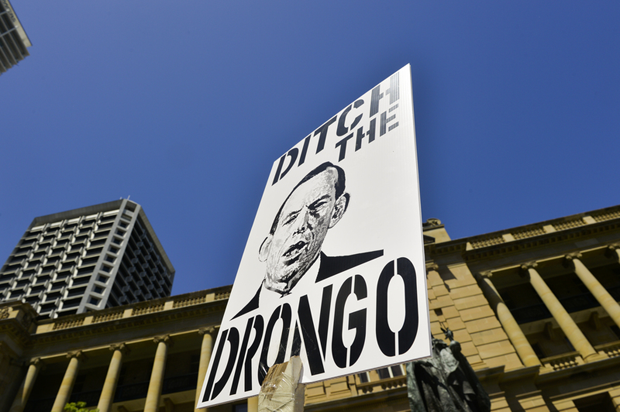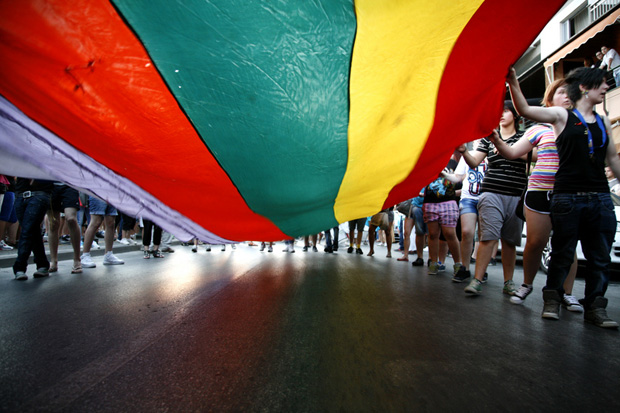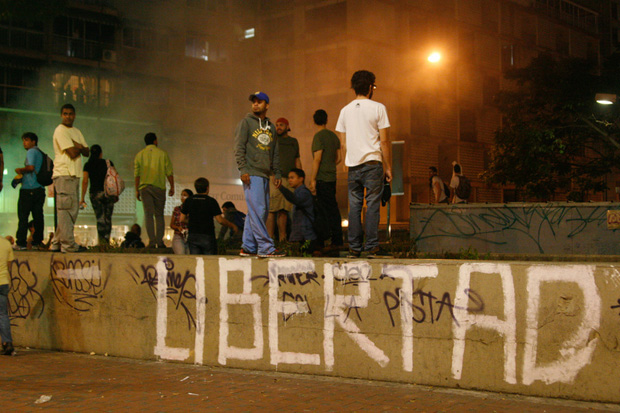8 Apr 2014 | About Index, Campaigns, Press Releases
A NEW CHAMPION FOR FREE EXPRESSION
Index announces new CEO
Index on Censorship, the organization that advocates for freedom of expression and against censorship throughout the world, is delighted to announce the appointment of our new Chief Executive Officer, Jodie Ginsberg.
Jodie, who takes up her post next month (mid-May), comes from the think-tank, Demos. A former London Bureau Chief for Reuters, Jodie worked for more than a decade as a foreign correspondent and business journalist. She was previously Head of Communications for Camfed, a non-profit organisation working in girls’ education.
The Chair of Index, David Aaronovitch, said; “Index is an indispensible organization and I am really pleased to have someone of Jodie’s experience and talents coming to us. Index’s work defending freedom of expression on- and off-line is more important than ever in the face of growing censorship in many countries around the world from Turkey to Russia, from Azerbaijan to India to China. I am sure Jodie will build on the great work of her predecessor Kirsty Hughes and all the Index staff, and lead Index into new and important campaigns.”
Jodie Ginsberg said: “Defending freedom of expression is not an easy task but it is a vital one. If we want to live in a world where everyone is free to speak, write, publish or perform without fear of persecution then we need to champion those rights every day. I’m thrilled to be leading an organisation with such an amazing track record in defending free expression and can’t wait to start working with our incredible roster of supporters and contributors.”
Outgoing CEO, Kirsty Hughes, said: “I am delighted that Jodie will lead Index in its vital campaigning work around the world. I wish her all success in this vital and exciting challenge.”
Press enquiries to [email protected]
8 Apr 2014 | Australia, News, Politics and Society

Disillusioned with the Abbott government’s agenda, protestors took to the streets of Brisbane on March 16, 2014. The rally was staged as a vote of no confidence in policy that some say goes against principles of humanity, decency, fairness social justice and equity. (Photo: Claudia Baxter / Demotix)
Australia is looking at repealing sections of the Racial Discrimination Act. Though the move has long been mooted by the government of prime minister Tony Abbott, recent moves to repeal parts of it–and specifically section 18C–has sparked public debate and anger on both sides of the political divide.
“People do have a right to be bigots you know,” attorney general George Brandis told the Australian Senate in late March. He was referring to the Abbott government’s repealing of section 18c of the Racial Discrimination Act which makes it unlawful to “offend, insult, humiliate or intimidate” people based upon their race.
Called by some the “Bolt clause” the repeal of this section has caused both outcry and debate. Conservatives, for the most part, applaud the action for reasons of freedom of speech. Others argue it sets a dangerous precedent and will allow more hate speech to go unchecked or unpunished. It also sends a wider message that racism is acceptable, critics argue.
The Abbott government’s stance can be traced back to 2011. News Limited columnist Andrew Bolt, who is one of the country’s best known conservatives, was found guilty by a federal judge of breaching the Racial Discrimination Act. Writing in Melbourne daily the Herald Sun in 2009 Bolt suggested in two stories that light skinned indigenous people claimed Aboriginality for their own gain. A federal judge found that the articles had not been written in good faith and would offend a reasonable member of the Aboriginal community. Bolt had argued his articles fell within the laws of free speech provisions and, after the ruling was handed down, called it “a terrible day for freedom of speech in this country.”
“In good faith” is important to note as the Racial Discrimination Act’s 18D stipulates that comments made in good faith are permissible as are expressions of genuine belief. Sections D, B and E will also be repealed, however. In their place it will be unlawful to vilify or intimidate persons based upon their race; however, “to intimidate means to cause fear of physical harm.” The new exemption is rather more broad: “This section does not apply to words, sounds, images or writing spoken, broadcast, published or otherwise communicated in the course of participating in the public discussion of any political, social, cultural, religious, artistic, academic or scientific matter.”
Section 18c does not actually carry a criminal penalty. It became law in 1995, partly through recommendations made by the Royal Commission into Aboriginal Deaths in Custody
In a March 12 editorial the Herald Sun pointed out that the government should not be there to adjudicate in cases where offense has been caused and “is to diminish people’s right to voice their opinions, blunt as they might be.” The paper pointed out that defamation laws–incidentally far more commonly used in Australia than any invocation of 18C–are generally more useful in determining if harm has been caused. Bolt has previously been sued for defamation by a Victorian judge.
Brandis has said he is a proponent of free speech and against the kind of internet filtering suggested previously under Labor whereby sites that were refused classification were simply blocked. Many of the sites–in a list published by Wikileaks–contained material that might have possibly been objectionable but was not illegal. As previously reported by Index, Brandis established a “Freedom Commissioner” in Tim Wilson in late 2013. Wilson has been a strong critic of the Australian Human Rights Commission, suggesting it had narrowed its horizons and focused more upon racial discrimination than freedom of speech. Before being appointed to the commission he attacked it for its silence on the previous Labor government’s new media regulations. Wilson made clear last year at the time of his appointment that would support repealing of 18C.
Though publicly committed to free speech Abbott has previously criticised national broadcaster ABC for its reporting of alleged abuse of refugees by the Australian Navy and its reporting of Australia’s tapping of Indonesian Prime Minister Yudhoyono’s wife’s phone, though under the previous administration, “a lot of people feel at the moment that the ABC instinctively takes everyone’s side but Australia’s.”
Though the coalition has lionised the restorative powers of a free press upon a free society, one of its own MPs, Ken Wyatt, has threatened to cross the floor on this issue, while according to the Sydney Morning Herald, MPs David Coleman and Craig Laundy had also expressed concern. Crossing the floor is, though permissible, a rarity dangerous to one’s political career.
Labor Senator Penny Wong and Leader of the Opposition in the Senate suggested that those arguing against 18C are viewing things in terms of “an abstract philosophical or legal argument… it’s a debate about words and principles…For people who have experienced racism… it’s actually a debate about real people and real hurt.”
This article was posted on 8 April 2014 at indexoncensorship.org
7 Apr 2014 | Europe and Central Asia, Greece, News

Thessaloniki Pride parade 2012 (Image: Konstantinos Tsakalidis/Demotix)
There is a “dictatorship of the gay minority” and gay people should be “treated” by members of Golden Dawn. These are only excerpts of a 15-minute homophobic rant by journalist Dimos Verikios during a recent episode of his daily show on Alpha radio station. The outburst was met with a number of complaints and social media outrage, and has been condemned by the Journalists’ Union of Athens Daily Newspapers.
Verikios was targeting gay writer Auguste Corteau, who revealed his sexuality by publicly stating that he won’t be joining new political party The River, preferring to stay loyal to his husband and his books. In response to this, the radio host among other things said: “That’s why society goes to hell. Being gay today and crying it out loud is considered a cunning behaviour and not a problem.”
Verykios’ outburst seems to be only the tip of the iceberg. Homophobic stereotypes and discrimination based on sexual orientation is widespread in Greece, both on state level and in wider society. The 2013 annual report by the European arm of the international gay right organisation ILGA, reports a wave of violence directed at the LGBTI community by extremists, ranking Greece 25th out of 49 European countries for gay rights. In 2012, European Commission against Racism and Intolerance urged Greek authorities to raise awareness “on the implementation of the principle of equal treatment regardless of racial or ethnic origin, religious or other beliefs, disability, age or sexual orientation”.
The extension of legislation (institution of civil partnership) to same sex couples has “frozen” because of continuing pressures from the Greek Orthodox Church, while at the same time the country has been found violating the European Convention of Human Rights. Index has previously reported on homophobic behaviour and attacks by Golden Dawn and its supporters. Firstly, regarding the persecution of people involved in the play “Corpus Christi” and secondly, regarding the mockery of journalist Tasos Theodoropoulos by the far-right publication called “Stohos”, and the subsequent attack on him.
Electra Leda Koutra is the president of the NGO Hellenic Action for Human Rights and lawyer for the Greek Transgender Support Association. She was harassed by policemen and illegally detained for a short while last June for trying to communicate with her transgender client. “Many cases do not reach the courts because of the ‘outing’ that the victims would have to unwillingly go through during the legal procedure,” she explains to Index, adding that many of these cases often go unresolved.
Verykios outburst was answered by a collective complaint from the LGBTQI community — nearly 20 organisations and collectivities took part — to the National Council for Radio and Television (ESR). The president of ESR, Ioannis Laskaridis, said told media that the volume of complaints filed was “unusual”.
Corteau is suing Verykios over the statements, posting on his Facebook page that: “I have decided that I have a duty to stand up for and protect the people I love and then any person that could find themselves in my position, a target of the poisonous language represented by Mr Verikios.” Corteau’s lawyer Christos Gramatidis explained the nature of the legal action to Index: “It is the first lawsuit of its kind (compensation for moral damages, eponymous opposing parties) based on the basis of attacking personality and consisting of libel and insult of gender identity. As a country we haven’t incorporated yet the European legal framework of combating intolerance”.
Gramatidis added: “There are so many people from the LGBTI community who accept bullying in schools and elsewhere in society but they do not have the ability to go into court.”
This article was published on 7 April 2014 at indexoncensorship.org
7 Apr 2014 | News, Venezuela, Young Writers / Artists Programme

(Image: Sergio Alvarez/Demotix)
Like other countries, Venezuela’s young are eager to explore the world. Every opportunity to learn becomes important in the formation of the young mind. In Venezuela, a crippled education system prevents normal development. While the well-born go to private schools and have access to every benefit, the mass of Venezuela’s students confront an educational system that tells them: “You can’t but you tried.”
The most embarrassing and painful thing about the deplorable state of the country’s schools is the level of the government’s indifference. Though the government of Nicolás Maduro offers programmes like “Simoncito”, “Mision Ribas” and “Mision Robinson” these is basic education that doesn’t adequately prepare students to pursue higher studies. The programmes seem to condemn the disadvantaged among Venezuela’s population to a remedial existence. If some of these children make it to higher education, the odds are stacked against them and their families.
In the end, it all comes down to money. Venezuela needs to spend more to let students be students. But with foreign reserves short, all but national priorities are left off the funding list. Every area of science instruction needs improvement. Budgets are not even close to covering the costs of labs, let alone providing learning aids or even actual textbooks. A prize-winning robotics team at Caracas’ Universidad Simon Bolivar works with outdated electronics that are often patched together. When the team wanted to take part in an international competition, they were denied assistance — meaning just a few of the team could do it because that was all they could afford to pay out of their own pockets. Another group, which took part in the Latin American conference of the model UN, found themselves staying in primitive conditions in Mexico because they were denied dollars, the currency they needed to pay bills. Despite the discomfort, the group won six awards.
Even with the obvious deficiencies in education, Venezuela has a large population of well-prepared professionals across a wide spectrum of expertise. But based on political affiliations, these people cannot work for the development of the nation. No wonder Venezuelans have begun to leave the country in search of a better future for themselves and their families. This exodus is manifesting itself worst of all among teachers. The ramshackle education system can ill afford this brain drain. But, again, it’s understandable when even those with advanced degrees from internationally respected institutions earn less than approximately £40 per month. When the government’s own basic food basket is priced at nearly £200 per month, it’s impossible to support a family without second or third jobs. Under strict rules, teachers are not allowed to apply for the loans that could support home or car ownership. In effect, teachers are sentenced to live with relatives for life. Yet they continue to teach out of love for the craft with the hope they they can raise a new generation of Venezuelans who can think for themselves and question dogma. Without them, the youth of Venezuela would be lost.
In recent interviews, the educational minister Hector Rodriguez said: “We are not going to take you out of poverty for you to go and become opposites.” His statement meant that Venezuela’s students should understand that their wings are already clipped and any dream of progress or improvement is invalid.
The government’s approach to education aims to make Venezuelans think it has the absolute truth and will decide what’s right for students. The lower classes won’t have any choice but to believe what they are told.
After 15 years Venezuelans have become accustomed to waiting for the government to wave a magic wand to provide what they need. The sense of personal responsibility now seems lost. Effort doesn’t deliver results, so Venezuelans don’t try. It’s an indirect way for the government to choose a person’s destiny.
At the same time, scarcity – and not just in an educational sense – is the new normal. Everyday basics like toilet paper, coffee or cooking oil are the subjects of long hunts that lead to the back of an equally long queue. Hospitals cancel operations for lack of supplies and cancer patients miss treatment for lack of medicine. And even though the government’s late March devaluation of the bolivar will fill the shelves in the shops, the average Venezuelan will be unable to afford the supplies.
For the government, scarcity is just a glitch — just like the blackouts when “iguanas eat the cables” – and not because the energy minister is not doing his job.
It’s impossible to walk down streets without being paranoid — one eye on the road and the other keeping watch of everything around you. On average 48 people are murdered in the country every day. Venezuelans can be beaten and robbed with no recourse to justice because the police and the criminals are often in partnership.
The Bolivarian Revolution was supposed to bring improvements, but the lack of daily essentials and a robust education system leads one to the conclusion: The basement has a bottom.
This article was posted on April 7, 2014 at indexoncensorship.org



